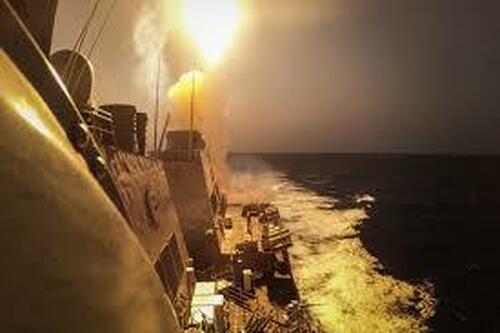
The White House on Tuesday declared that Iran has been “incredibly” weakened as a result of the Pentagon operation against Yemen’s Houthis which was renewed on March 15 by President Trump and his national security cabinet.
Immense controversy has ensued in the wake of ‘Signalgate’ which involved discussions of war planning with Atlantic journalist Jeffrey Goldberg privy to the group chat conversation.
White House spokesperson Karoline Leavitt said there’s has been over 200 strikes on targets in Yemen. It has long been a US talking point going back to 2015 that the Houthis (Ansarallah movement) has been supplied by the Iranians. Shipments of Iranian weaponry has over the years been intercepted by US naval ships in Gulf area waters.
The group has fired at least eight ballistic missiles on Israel over the past week, but the US is leading the way in anti-Houthi operations.
“There have now been more than 200 successful strikes,” Leavitt said. “Iran is incredibly weakened as a result. They’ve taken out Houthi leaders, critical members who have been launching strikes on naval ships and commercial vessels. This operation will not stop until the freedom of navigation in this region is restored.”
The Houthis haven’t confirmed the deaths of any leaders, nor has the US side acknowledged the repeat attacks on US warships or the carrier USS Truman.
According to some of the latest:
According to a brief statement broadcast by the Houthi-run al-Masirah TV, five airstrikes at dawn targeted the Jarban area in the Sanhan district southeast of Sanaa, while two others hit the Bani Matar district west of the capital.
The statement further indicated that Saada, a stronghold of the group, was subjected to 15 U.S. airstrikes overnight, but did not disclose specific locations targeted.
Israeli media and The Associated Press have meanwhile said that these last two weeks of strikes on Yemen have been far more devasting than similar aerial assaults under Biden.
According to a report featured in center-left Times of Israel:
A new American airstrike campaign against Yemen’s Houthi rebels appears more intense and more extensive, as the US moves from solely targeting launch sites to firing at ranking personnel as well as dropping bombs in city neighborhoods, an Associated Press review of the operation shows.
The pattern under US President Donald Trump reflects a departure from the Biden administration, which limited its strikes as Arab allies tried to reach a separate peace with the group. It comes after the Iran-backed Houthis threatened to resume attacking “any Israeli vessel” over the country’s refusal to allow aid into the Gaza Strip.
Both sides appear content to keep mum on the extent of ‘success’ of the back-and-forth attacks. But the consensus among war analysts is that if the Houthi threat to Red Sea shipping is to be rooted out, it will take a long, sustained campaign – which we should note has not had formal war authorization from Congress.
“Folks that say, ‘We’ll go in there and take out everyone with the last name Houthi and we’ll win.’ The Houthi leadership has been taken out in history in the past, and they are resilient,” said retired US Navy Vice Adm. Kevin Donegan, per AFP. “They came back and they grew stronger. So this isn’t something that is a one-and-done.”
.@PressSec: “These Houthi strikes have been incredibly successful. Last time I was at this podium, there were more than 100 successful strikes. There have now been over 200 successful strikes — Iran is incredibly weakened as a result of these attacks.” pic.twitter.com/FEPyvFH5c8
— Rapid Response 47 (@RapidResponse47) April 1, 2025
As for Iran, it costs little for it to wage proxy war against US Navy ships positioned in the region. In a sense, the Pentagon is in the Iranians’ backyard. Already, the Houthis have claimed to have downed the 16th US MQ-9 Reaper drone as of Tuesday, which hasn’t been acknowledged as yet by the Pentagon. The controversy over the scope of US actions will likely only grow among the American populace.
Tyler Durden
Tue, 04/01/2025 – 23:00